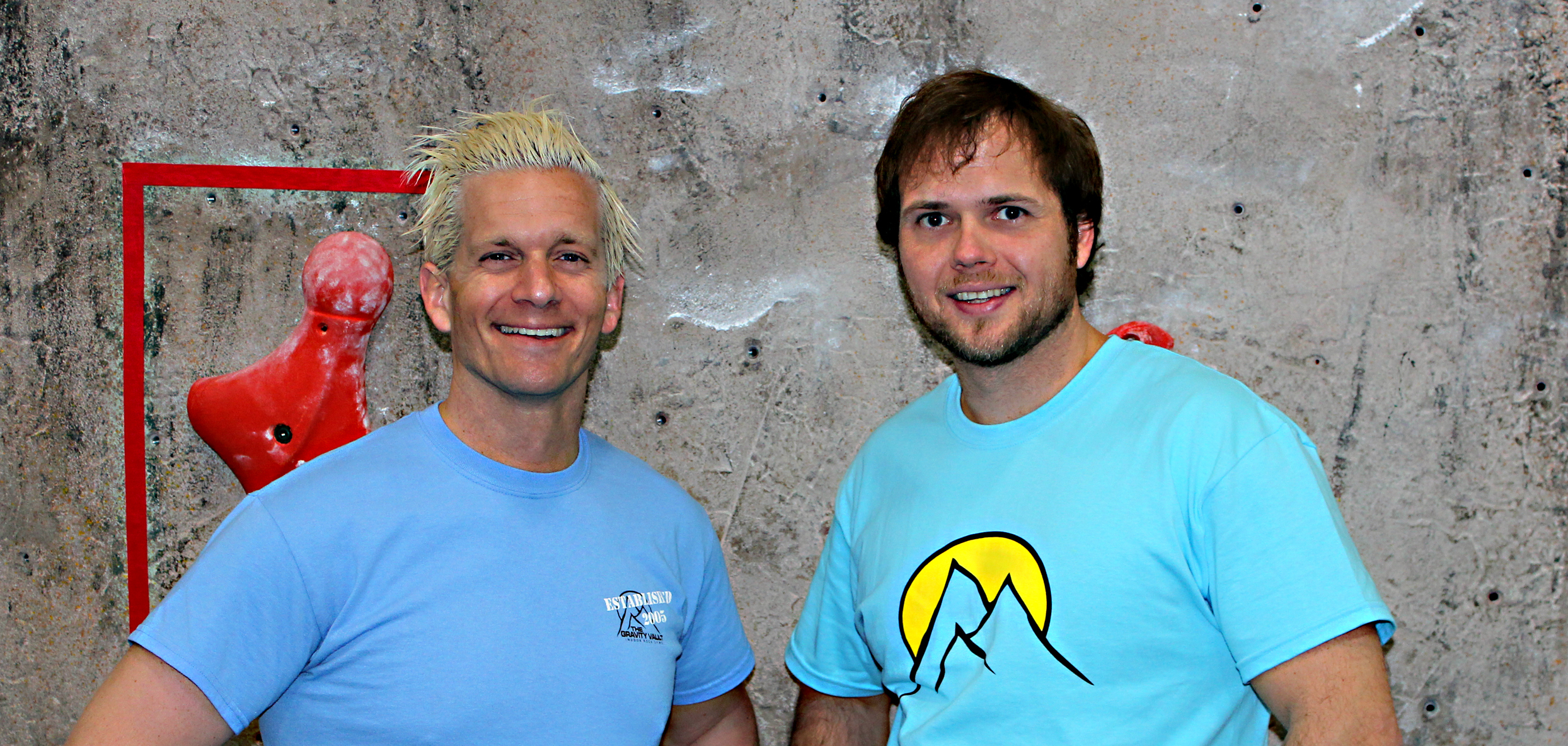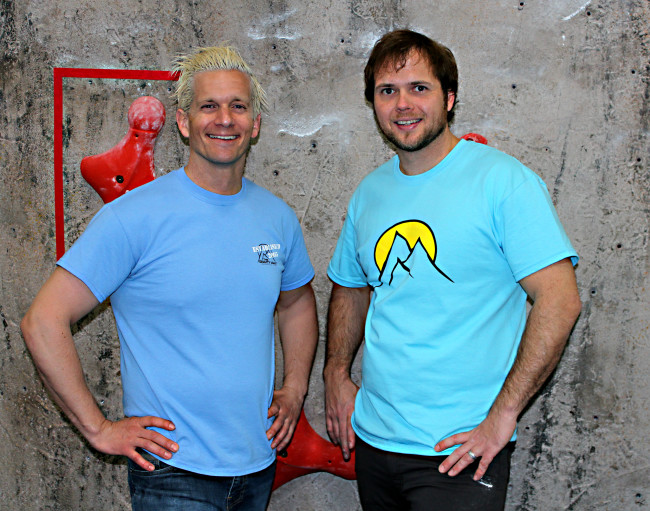
If you type the search term “climbing gym franchise” into your favorite web search engine, there is only one name that comes up. That name is Gravity Vault.
Like almost every successful climbing gym in North America, Gravity Vault wants to expand. But unlike other gyms, they are going about it in a totally different way.
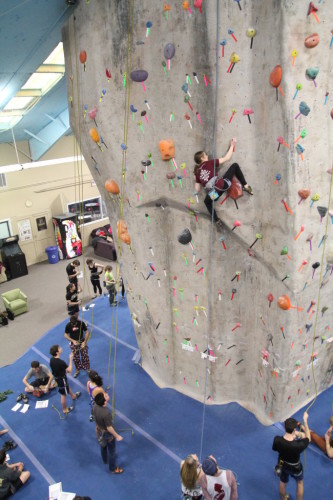
New Jersey-based Gravity Vault Climbing Centers is the first climbing gym company in America, and possibly the world, to franchise their brand. After 8 years and building two corporate locations, Gravity Vault just opened their first franchised location in Middletown, New Jersey. They have also signed a contract to open their second franchised location in Allentown, PA later this year, and are looking at Hudson County, NJ for a third corporate location coming soon.
The big question many traditional developers are asking is why franchise your brand? For Lucas Kovalcik, co-founder of Gravity Vault, it comes down to changing people’s lives through the sport of climbing. Kovalcik and his partner Tim Walsh have decided that the most effective way to introduce the sport, and their brand, to new climbers is to help other entrepreneurs open climbing facilities with the Gravity Vault name.
“We don’t have the ability to open something in California or Florida, it’s far from where we are geographically located. A business owner should to be able to engage with their employees and know what is going on, and to manage the facility properly they need to be close by. We feel that franchising gives us that opportunity to spread a little wider and broader than we would be able to by ourselves,” Kovalcik told CBJ in a phone interview.
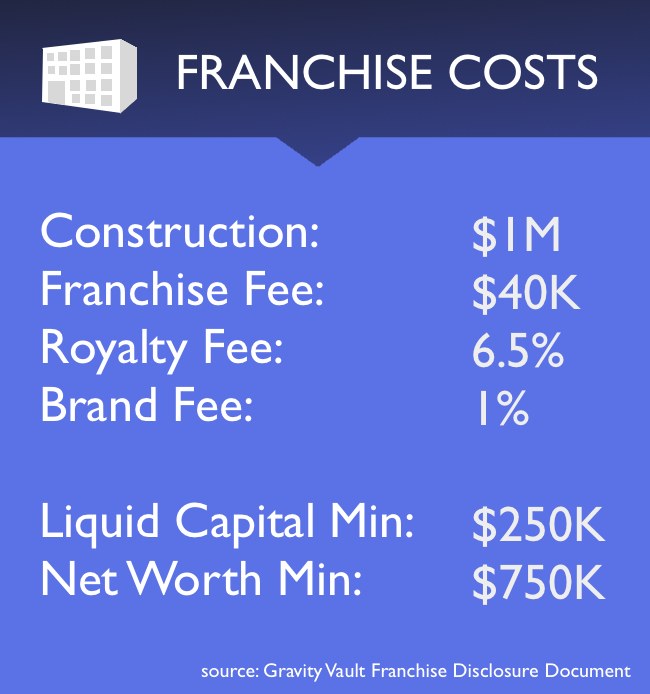
Spreading the gospel of climbing has its own merits, but there also needs to be some sound financial reasons behind franchising their business. According to Gravity Vault’s Financial Disclosure Document, a typical climbing gym will require $746,400 to $1.2 million in startup capital, which of course comes out of the franchisee’s pocket. Each franchisee must also pay a one-time franchise fee of $40,000 plus a 6.5% royalty on weekly gross revenue plus a 1% brand development fee to the Gravity Vault parent company.
In the recent CNBC TV show “Power Pitch” Gravity Vault owners Walsh and Kovalcik asserted that their two current locations have a gross revenue of $1 million each.
That means that the Gravity Vault parent company stands to make upwards of $75,000 a year in royalties from each franchised location.
The Franchise Package
The next obvious question is what does a franchisee get for all this money? Kovalcik said Gravity Vault helps the franchisee with everything they need to open and run a successful climbing gym. “We provide support on everything from financing to real estate to site selection to negotiating with vendors on what you’re purchasing and what you’re selling, to setting up your computer and software systems to providing all the training on how to run the climbing gym, the literature the programs and everything else,” Kovalcik said.
Once a contract is signed a franchisee will go through two weeks of training at a Gravity Vault corporate location and then one week at the new facility. But the cord is not cut there. Gravity Vault offers ongoing support and a place to ask questions and get advice.
By teaming up with seasoned gym owners like Kovalcik and Walsh, franchisees get the benefit of starting out with a business strategy that has been proven in the field. Gravity Vault has been testing and refining their operating systems since they opened their first location in 2004. “It took us nearly eight years to really iron out all the details of what we do on a daily basis,” said Kovalcik. For franchisees, this means less trial and error, and ideally more successes out of the gate.
Franchisee Number One
The first Gravity Vault franchise location features 40 foot walls and 15,000 square feet of climbing inside a 12,000 square foot building in Middleton, NJ. The facility’s owner, Sam Wright, has a daughter on the climbing team at Gravity Vault’s Chatham location. For his day job, Wright works for an accounting firm that works with teams looking to buy companies and advises them on how to make the businesses successful. Wright told NJ.com:
“I’ve looked at a lot of other people’s businesses, so I’ve always wanted my own,” he said. “But I never wanted to own a restaurant and never really had an idea what I would do until this opportunity came up and it fit everything I was looking for. It was something that was fun and that would be coming to Monmouth County, where there’s really nothing else like it down here. It’s the untapped potential of the business model I like.”
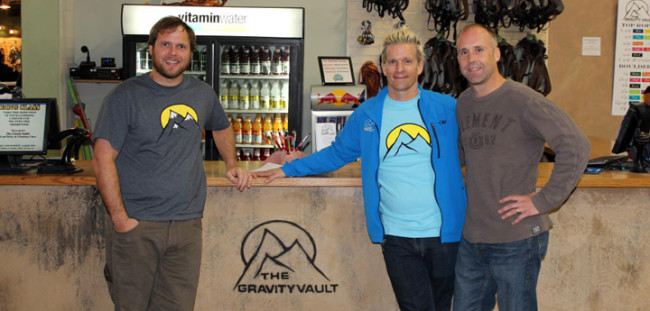
Brand Control
Unlike other franchisers that require each location to look exactly alike, Gravity Vault does not exert a lot of control on its franchisees. There is no required paint scheme or pre-determined layout, and franchisees get to select their own wall manufacturer. But Gravity Vault does want to maintain some consistency.
“Whether [customers] are in Pennsylvania or New Jersey we want them to feel like they are in a Gravity Vault — nice friendly facility, well lit, same type of programs, same type of pricing, same type of specials, same type of memberships,” said Kovalcik.
Gravity Vault wants its franchisees to have flexibility to meet the demand of their local market but still maintain a certain level of consistency. “As far as little nuances and differences we welcome that. We recognize that different markets require different things,” Kovalcik said.
Future Development
Some gym developers may be dubious of a franchise model, but Gravity Vault seems to have no problem finding people interested in becoming a franchisee. Most gym owners in America receive calls on a regular basis from people wanting to partner with them on a future project. But after the SBA named them New Jersey business persons of the year and they made an appearance on the MSMBC show “Power Pitch”, Walsh and Kovalcik have been inundated by prospective developers.
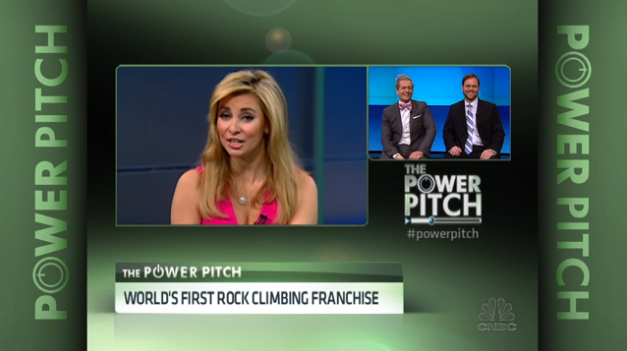
Kovalcik said that they’ve been talking to upwards of a dozen potential candidates in a number of different states, but “strategically we’ve been looking at the five surrounding states: New York, New Jersey, Connecticut, Pennsylvania, Delaware.”
All this man-power and initiative will not just be in the Northeast. “Now we’re looking at California as our first outreach destination,” Kovalcik said. They’ve recently been approved to operate franchises in that state, and have been in discussion with candidates looking to develop in Los Angeles, Orange and San Diego counties in southern California, as well as Nevada county, which lies about three hours northeast of San Francisco.
“We are not looking to step on toes, if you will, of any of the current operators. California is such a big state and there are a lot of underserved markets that don’t have climbing gyms currently, and we’re looking to develop a number of those markets,” Kovalcik said.
Walsh told NJ.com that Gravity Vault hopes to franchise 5 – 8 locations in 2014, and to expand to 45 locations in the next five years.
For Kovalcik all this expansion just means that they get to change more lives through climbing. And if they get to build a solid nationwide brand on top of that, even better.
“I really do believe there’s a lot of great benefits you bring to a community by bringing them a climbing gym and introducing people to the sport,” Kovalcik said. “Creating healthier lives. Creating a place where people can bring their families to climb — something you can do with your five year old or with your grandfather!”

Climbing Business Journal is an independent news outlet dedicated to covering the indoor climbing industry. Here you will find the latest coverage of climbing industry news, gym developments, industry best practices, risk management, climbing competitions, youth coaching and routesetting. Have an article idea? CBJ loves to hear from readers like you!



